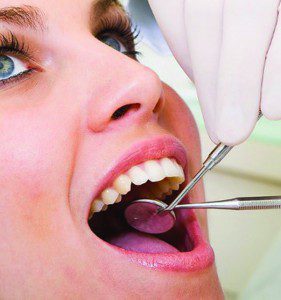Dr. Alexander Gaukhman
 Appears as a growth or sore in the mouth that does not go away and includes cancers of the lips, tongue, cheeks, floor of the mouth, hard and soft palate, sinuses, and pharynx (throat), can be life threatening if not diagnosed and treated early.
Appears as a growth or sore in the mouth that does not go away and includes cancers of the lips, tongue, cheeks, floor of the mouth, hard and soft palate, sinuses, and pharynx (throat), can be life threatening if not diagnosed and treated early.
According to the American Cancer Society, men face twice the risk of developing oral cancer as women, and men who are over age 50 face the greatest risk. It’s estimated that over 40,000 people in the U.S. received a diagnosis of oral cancer in 2014.
The most common symptoms of oral cancer include:
• Swellings/thickenings, lumps or bumps, rough spots/
crusts/or eroded areas on the lips, gums, or other areas inside the mouth
• The development of velvety white, red, or speckled (white and red) patches in the mouth
• Unexplained bleeding in the mouth
• Unexplained numbness, loss of feeling, or pain/tenderness in any area of the face, mouth, or neck
• Persistent sores on the face, neck, or mouth that bleed easily and do not heal within 2 weeks
• A soreness or feeling that something is caught in the back of the throat
• Difficulty chewing or swallowing, speaking, or moving the jaw or tongue
• Hoarseness, chronic sore throat, or change in voice
• Ear pain
• A change in the way your teeth or dentures fit together
• Dramatic weight loss
The overall 1-year survival rate for patients with all stages of oral cavity and pharynx cancers is 81%. The 5- and 10-year survival rates are 56% and 41%, respectively. If you notice any of these symptoms, contact your dentist immediately!
How Is Oral Cancer Diagnosed?
As part of your routine dental exam, your dentist should conduct an oral cancer screening exam. More specifically, they will feel for any lumps or irregular tissue changes in your neck, head, face, and oral cavity. When examining your mouth, your dentist will look for any sores or discolored tissue as well as check for any signs and symptoms mentioned above.
Your dentist may perform an oral brush biopsy if he or she sees tissue in your mouth that looks suspicious. This test is painless and involves taking a small sample of the tissue and analyzing it for abnormal cells. Alternatively, if the tissue looks more suspicious, your dentist may recommend a scalpel biopsy. This procedure usually requires local anesthesia and may be performed by your dentist or a specialist. “These tests are necessary to detect oral cancer early, before it has had a chance to progress and spread.” Says Dr. Gaukhman
How Is Oral Cancer Treated?
Oral cancer is treated the same way many other cancers are treated — with surgery to remove the cancerous growth, followed by radiation therapy and/or chemotherapy (drug treatments) to destroy any remaining cancer cells.
What Can I do?
• Conduct a self exam at least once a month. Using a bright light and a mirror, look and feel your lips and front of your gums. Tilt your head back and look at and feel the roof of your mouth. Pull your checks out to view the inside of your mouth, the lining of your cheeks, and the back gums. Pull out your tongue and look at all surfaces; examine the floor of your mouth. Look at the back of your throat. Feel for lumps or enlarged lymph nodes in both sides of your neck and under your lower jaw. Call your dentist’s office immediately if you notice any changes in the appearance of your mouth or any of the signs and symptoms mentioned above.
• See your dentist on a regular schedule. Even though you may be conducting frequent self exams, sometimes dangerous spots or sores in the mouth can be very tiny and difficult to see on your own. The American Cancer Society recommends oral cancer screening exams every 3 years for persons over age 20 and annually for those over age 40. During your next dental appointment, ask your dentist to perform an oral exam. Early detection can improve the chance of successful treatment – Call today to schedule an appointment!
Siesta Dental
Sarasota
5223 Avenida Navarra
Sarasota, FL 34242
(941) 266-7000
Osprey
416 S. Tamiami Tr. Suite F1
Osprey, FL 34229
(941) 497-5650
Venice
463 US HWY 41 Bypass S.
Venice, Fl 34285
(941) 375-4488







